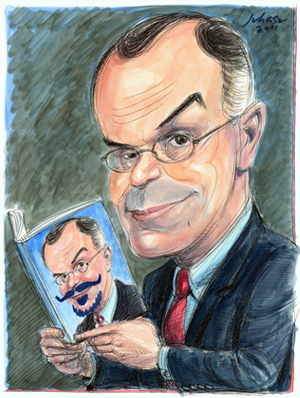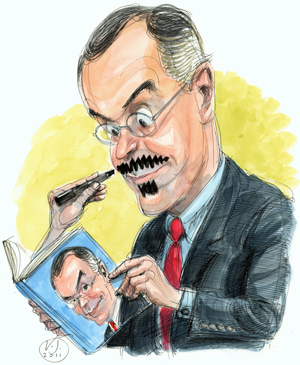Bobos in parodies
David Brooks proves he can take a punch line, selecting the best spoofs of his New York Times op-ed columns.
By (the real) David Brooks, AB’83
Illustrations by Victor Juhasz

I graduated from the University of Chicago at a pivotal moment in intellectual history. Whereas one generation saw Edmund Burke and Reinhold Niebuhr as two rival approaches to the crisis of modern ontology, members of my generation saw Burke and Niebuhr as excellent names for Restoration Hardware love seats.
This was followed, 37 seconds later, by another pivotal moment in intellectual history, which amazingly coincided with a column deadline. This latter pivot I have termed, at different moments, the Great Divorce, the Death of Culture, the Rebirth of the Premodern, the Remarriage of the Great Divorce, and the Premodern is Back But Needs Dialysis.
This epochal shift in Human Attitudes produced two sorts of people: those who understand that American society is divided into two sorts of people in 459 different ways, and those who think Barack Obama cares a rat’s ass what they think.
Out of my lighthearted yet banal efforts to reconcile these opposing camps comes an invitation to judge the Magazine’s contest in which readers/fellow alumni parody my writing. My original thought was: “How redundant! I do that in the Times twice a week.” But having read the many fine entries, I am happy to select a winner that not only possesses special sparkle but also takes a happy nibble at two colleagues, thus earning bonus points.
John Liuzzi’s (AB’94, MPP’01) spoof of The Conversation dialogue blog where I collaborate with Gail Collins (and, in Liuzzi’s version, where Paul Krugman makes a memorable cameo appearance) takes the top prize.
Honorable mentions go to Rob Cuthbert, AB’01, who wrote about the rank ignorance of American culture, and to Allen Cooper and Meredith John, both AB’07, for their meditation on the “Little League ethic” and the spirit of predatory lending.
It is a great honor to receive this attention from the Magazine and to know that I have not yet slipped beyond parody.
The winner
Trending topics
By John Liuzzi, AB’94, MPP’01
Rather than parodying Brooks’s regular column, I took a slightly different tack: an excerpt from The Conversation blog from the Opinionator section of the New York Times website. Brooks and columnist Gail Collins have a discussion, and the Times shows it’s hip to the whole online thing. I love these exchanges; they give you a taste of the usual polished highbrowing found in his columns, seasoned with a dash of the more spontaneous, I’m-just-like-you-except-I-think-about-really-big-things-constantly Brooks we see on PBS when something important is going on in our national life.
Gail Collins: Have I mentioned yet how smart you are?
David Brooks: Not yet. But if you do, I’ll give you a chance to be humorous in a folksy but insightful way that allows you to relate big policy issues to your everyday life.
Collins: Deal. The other day, while busy poisoning cockroaches in my basement and thinking about our country, I wondered if the roaches were aware of the trend—namely, my poisoning them en masse. So, of course, I thought of you. Have you given any thought recently to whether our country is aware of this sort of thing these days?
Brooks: What, your murderous tendencies? And are you likening me to a bug?
Collins: No, I’m talking about trends!
Brooks: Ah! It so happens I have. There’s an interesting trend going on in the country right now. People seem to be increasingly skeptical of pundits who talk incessantly about trends going on in the country, even those happening right now. But is this really a trend? So I figured I needed to talk to people around the country to get a representative sample, you know, people in both New York and Washington, DC.
Collins: Wow!
Brooks: And you know what? They all concurred.
Collins: Really?
Brooks: There seems to be a troubling trend arising whereby some people have a hard time fathoming that in order to have a high-functioning society, America desperately needs to embrace a more trend-based approach to understanding trends. Plenty of other countries have done this, with good results. For instance, did you know that starting in the 1970s, fully 15 developed nations began to monitor the impact of trends in their countries? Want me to list those countries and what methodologies they each used?
Collins: David, are you writing a book on this by any chance?
Brooks: Umm, no. And even if I were, I certainly wouldn’t milk it by using it to create columns seemingly out of left field when I can’t think of anything else to write, but that’s another—
Paul Krugman: You know, what really gets me is the absolute idiocy of our policy makers in their refusal to do what I recommend when it comes to the economy. Why is it so hard to accept that I should be solely responsible for setting interest rates? After all, it’s not like I have a Nobel Prize and a hugely popular column that sometimes talks about economics or anything LIKE THAT. This of course is an enduring by-product of years of the Republican-University-of-Chicago-industrial complex that makes me so mad I could tear my beard out. Fools. I loathe them all SO MUCH! ARRGH!
Collins and Brooks: Paul, you’re in the wrong blog conversation.
Krugman: Sorry, my mistake.
Brooks: So it looks like we’re out of space for today.
Collins: But I didn’t get a chance to be homespun but trenchant.
Brooks: It’ll have to wait until next time.
Collins: But you say that every week, and …
Honorable mentions
Loss of rank
By Rob Cuthbert, AB’01
One night in 1983, as my college graduation neared, 105.97 million Americans tuned in to the final episode of M*A*S*H.

I wasn’t planning to watch. I had an article to write for the college newspaper. However, someone reminded me that—sociologically speaking—it might be a good idea to have a beer and observe others watching. This is also how Mark Shields eventually got me to play canasta.
At the time, it was a bust. There were few parallels I could draw between anything Tocqueville had noticed about the American character and what I solicited from classmates during the commercial breaks.
Today, in light of my semiweekly deadline, the significance is obvious. Up until the end of M*A*S*H, most Americans had a deeply ingrained knowledge of military rank. Post-Vietnam, M*A*S*H educated Americans on the difference between a colonel and a corporal. Once M*A*S*H ended its run, knowledge of rank declined.
When Colonel Potter, the commander of the 4077th M*A*S*H, walked in the room with a silver bird on his hat, it was obvious that he was in charge. Thereby, civilians learned that the soldiers with silver birds on their hats are in charge.
It’s a shorthand that isn’t limited to martial drama. Charlie Rose wears Ralph Lauren Purple Label. Thereby, when a panel of journalists and academics are on his show, he is in charge. By 1984, Americans were taken with rankless heroes like those on the A-Team. Fictional service members were divorced from their bureaucratic origins and rarely appeared on screen in a uniform.
The organizational structure of the military has become arcane to many civilians. So, fittingly, civilians celebrate service and valor but rarely acknowledge differences in responsibility, and in 2011 real service members have benefited.
During my travels in Afghanistan, an enlisted service member asked me if his rank would bar him from attending an elite college and pursuing his ultimate goal of becoming a socially moderate Republican.
Of course, I was flattered, but also honored, to tell him that in the admissions game, for both officer and enlisted, rank has been mostly decoupled from any evaluation of the sacrifice of service. He stood an excellent chance of breaking into the meritocracy. But, just to make sure, I took down his vitals and let Nate Silver, AB’00, run a regression analysis. Nate agreed.
I don’t wish for the circumstances that would force rank back into the national vocabulary. As long as we are more inclined to celebrate service without overevaluating a veteran’s resume, the greatest number of veterans will receive a competitive advantage when applying to schools or for jobs.
Illustratively, in Doonesbury Garry Trudeau depicts Alex, an MIT graduate, trying to love and heal her boyfriend Toggle, a wounded Iraq veteran from a lower-class background. From what I can tell, Alex never cared about Toggle’s rank, and Toggle never cared about Alex’s degree. Someday, I hope that the two can find a reasonable property-tax rate where they can raise a family.
The Little League ethic
By Allen Cooper, AB’07, and Meredith John, AB’07
After reading this column, go back and read the rest of this newspaper; read yesterday’s; go back a couple of months, even a couple of years, a couple of decades, and make a catalog of all the news stories describing wealth and well-being in America.
Put them into an animated time-lapse chart. From the start, you’ll see that the haves have a lot and the have-nots have a little. As you proceed through globalization, Bush’s tax cuts, and the economic meltdown, you’ll see the haves surge upward to the right, and the have-nots sink downward to the right.
Some people see this divergence as society destabilizing, splitting in two, nuclear fission—watch out for the mushroom cloud.
And as the time-lapse charts for many other countries increasingly show the same phenomenon, it’s looking like they could beat us to the mushroom cloud.
But the truth is, there’s just been a change in the shape of our community. As Americans, we know our time-lapse chart spells our demise if we pay attention to the lines. So we don’t. We must look for the shape, the values. Interestingly, our time-lapse chart is taking the shape of two foul lines delineating a baseball field.
Forget the lines that divide us, just swing for the fences.
Over the next few decades, a lot of people will get richer selling education for a profit. They’ll get those at the margins of society—the taxpayers—to foot the bill for school loans that cannot be repaid. Because there are now a lot of people who’ve figured out how to predatory lend. The question is, do they know how to reshape the lines?
In a world relatively equal in its inequality, the United States will have to learn to define itself not by its rank, but by its values. It will be important to have the right story to tell, the right purpose, the right aura.
For America to do this, we’d have to do a better job of celebrating and defining predatory-lending values. We’d have to do a better job of nurturing our predatory-lending class. We’d have to have American business doing what it does best: hawking a cheap-plastic-derivative-smoke-and-mirrors-hollow-nonbiodegradable-toxic-disposable hope that you, too, can be Robert Redford in The Natural.
And we’d have to emphasize that predatory lending didn’t create the haves and have-nots. It was the social context undergirding predatory lending—not just girding, not just surrounding, protecting, insulating, deflecting, but undergirding; not just a belt, think a loincloth, a girdle. It’s the belief that the best man wins, that sportsmanship rules, that the playing field is level: the Little League ethic.
For centuries, people have ridiculed American society for being hypocritcal, unequal, and unjust. But Ron Popeil’s Showtime Rotisserie wins in the end. The predatory-lending century could be another American century. Because we have what the rest of the world needs: the knowledge that it’s not the size of your gut, it’s the strength of your girdle.
